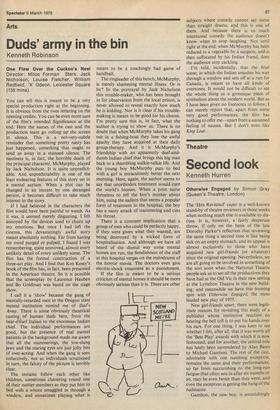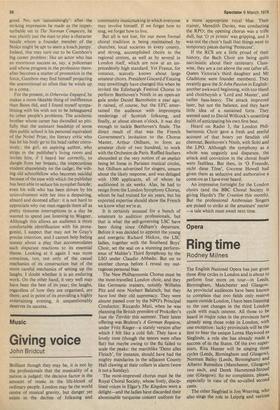Theatre
Second look
Kenneth Hurren
Otherwise Engaged by Simon Gray (Queen's Theatre, London) The 'Hits Revisited' caper is a well-known stand-by of theatre reviewers in those weeks when nothing much else is available to discuss. It is, however, a fairly desperate throw, if only on the basis of the late Dorothy Parker's reflection that reviewing the same thing a second time is like being sick on an empty stomach, and its appeal is almost exclusively to those who have acquired new girl-friends (or whatever) since the original opening. Nevertheless, we are all going to be involved in something of the sort soon when the National Theatre people ask us to see all the prciductions they have had at the Old Vic in their new setting at the Lyttelton Theatre in the new building; and meanwhile we have this training spin with Otherwise Engaged, the most lauded new play of 1975.
New girl-friends apart, there were legitimate reasons for revisiting this study of a publisher whose instinctive reaction on hearing the bell toll is to put his hands over his ears. For one thing, 1 was keen to see whether I felt, after all, that it was worth all the 'Best Play' awards with which it is now festooned, and for another, the central role has lately been surrendered by Alan Bates to Michael Gambon. The rest of the cast, admirable with one numbing exception, remains the same and their performances, so far from succumbing to the long-run fatigue that often sets in after six months or so, may be even better than they were, and even the exception is getting the hang of the rudiments.
Gambon, the new boy, is astonishingly
good. No, not 'astonishingly': after the striking impression he made as the imperturbable vet in The Norman Conquests, he was plainly just the man to play a character beside whom a founder member of the Stoics might be apt to seem a touch jumpy. Indeed, this may turn out to be Gambon's big career problem: like an actor who has an enormous success as, say, a policeman and whose progress in the profession thereafter becomes a matter of promotion in the force, Gambon may find himself projecting the unemotional so often that he winds up in a coma.
For the present, in Otherwise Engaged, he makes a more likeable thing of indifference than Bates did, and 1 found myself sympathising with his wish not to be beleaguered by other people's problems. The academic brother whose career has dwindled so pitifully that the assistant headship of some dim public school is his personal equivalent of the Nobel Prize; the literary critic who has let his body go to his head rather corrosively; the girl, an aspiring author, who strips in the publisher's living room and invites him, if I heard her correctly, to dangle from her breasts; the impecunious student shamelessly on the cadge; the wilting old schoolfellow who becomes suicidal because of the ease with which the publisher has been able to seduce his nymphet fiancée; even his wife who has been driven by his uninvolvement with her into a despairing, absurd and doomed affair: it is not hard to appreciate why our man regards them all as pretty tiresome interruptions in a day he wanted to spend just listening to Wagner. Although this allows an audience a more comfortable identification with his protagonist, I suspect that may not be Gray's precise intention, and I cannot help feeling uneasy about a play that accommodates such disparate reactions to its essential theme. Looking at it again I was more conscious, too, not only of the casual mechanics of its construction but of the more careful mechanics of setting up the laughs. I doubt whether it is an enduring work. On the other hand, it very well may have been the best of its year; the laughs, regardless of how they are organised, are there; and in point of its providing a highly entertaining evening, it unquestionably deserves its success.



































 Previous page
Previous page